Table of Contents
Whenever your hair follicles get plunged with oil and dead cells, Acne is formed. It only is the cause of blackheads, whiteheads or pimples in the face. This skin condition is common in teenagers however anyone can get affected.
When acne is inflamed, it forms an acne scar. The pores swell leading to the follicle wall collapsing. If the lesion formed is shallow, the skin heals quickly. However, a deep break in the on the follicle wall leads to the spillage of infected material hence causing dipper injuries. Just like any other injury, the skin tries to repair the affected area using collagen fibers. However, the final product is not as smooth and flawless as it initially were.
See also:
There are two types of acne scars:
Hypertrophic scars
This type of scar forms when the body produces too much collagen as a result of trying to heal an acne scar. The result is a vast mass of tissue lying on the surface of the skin.
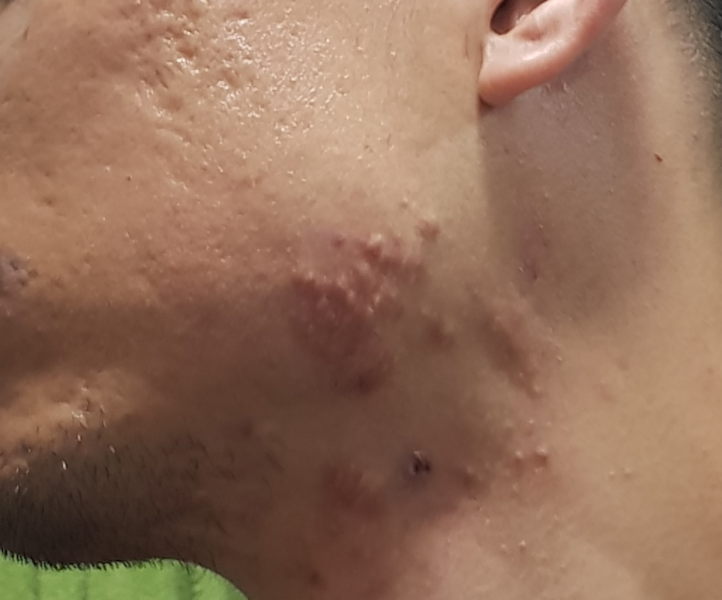
Atrophic Scars
These scars arise as a result of losing tissue. The two most common scars that fall under this group are Icepick scars and Boxcar scars.
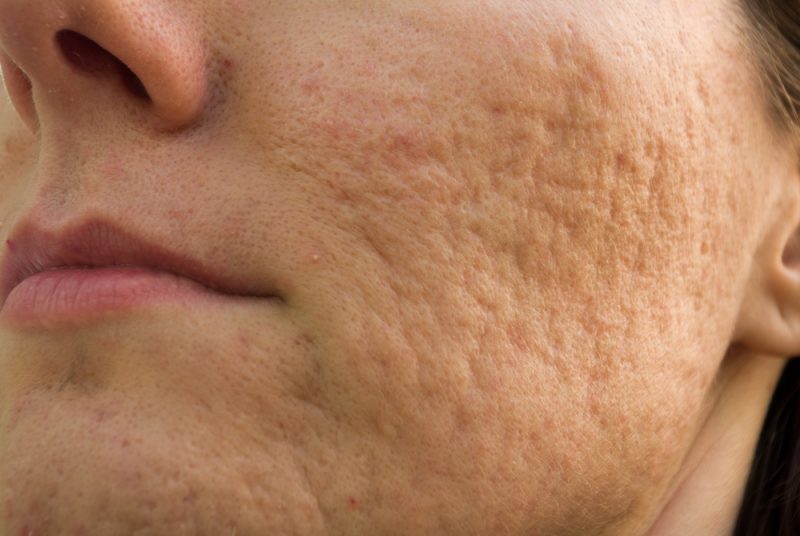
Treating acne scars is not easy. You are required to get professional help if you want to see noticeable results. Even so, most people go for over the counter drugs. However, they are of no much use apart from improving the skin discoloration. When you seek professional help, you can get specific procedures to enhance the look and texture of your skin depends on the scaring you have.
If you have multiple types of scaring, you would require numerous treatment options to get the best results.
Below is a compilation of the different acne categories with their treatment options.
Ice Pick Scars
It is characterized by a deep narrow scar all the way into the dermis. It looks like a sharp object pierced the skin. The scar makes a small deep hole in the skin. The ice pick scar develops its way to the top of the skin leaving behind a long deep scar.
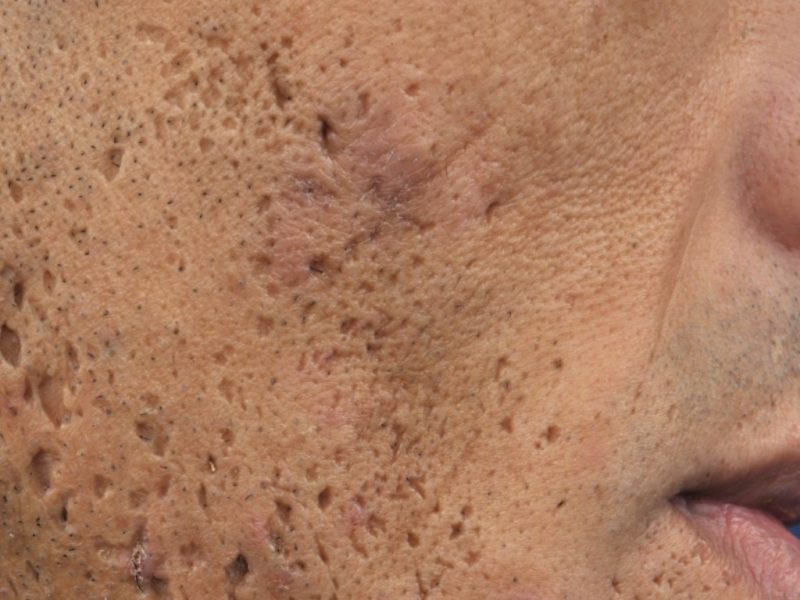
Treatment
Some ways you can treat an Ice pick scar are;
Punch excision – the health practitioner, cuts out the scar and joins back the skin together to heal.
Punch grafting – when the ice pick scar is deeper, punch grafting is done. Similar to excision, the damaged tissue is first removed. A graft piece is then put in place of the scar tissue. Grafting improves the skin’s texture.
The two processes both leave small scars. However, it does an excellent job to make the skin surface as flat and as possible.
Boxcar Scars
These are scars on the face that are round or oval and with sides that are steep and vertical. Since they are more extensive than the ice pick scars, the skin has an uneven look. The boxcar scar comes about as a result of an inflammation breakout that destroys collagen leaving a depressed area.
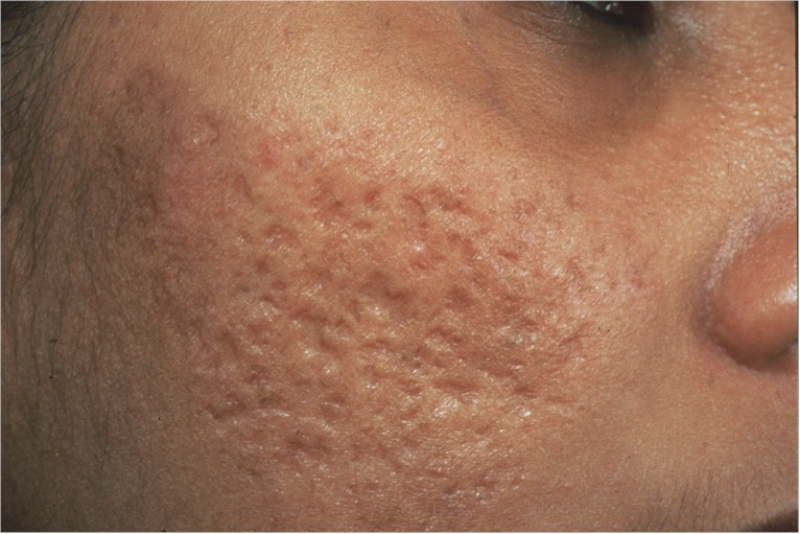
Treatment
The process involves creating a collagen layer underneath the skin. Depending on the level of damage, you may require to get a series of consecutive treatments.
One method of treatment is the use of dermal fillers. Once injected into the area with the scar, they help to raise the depressed part of the skin leveling it with the surrounding skin. The procedure is faster and more straightforward compared to all the other acne treatments. The only disadvantage is that the dermal fillers are not permanent and new ones can only last for two years.
Another method of treatment is skin resurfacing using a laser. To create new collagen beneath the surface, you need a retinoid to help boost the cell turnover and further help the collagen. The lasers used in scar treatment are all different. Your medical practitioner can advise you on the right one for your skin treatment. Lasers help to stimulate the formation of collagen hence improving the tone and skin texture.
Rolling Scars
One form of a depressed scar, it has smooth edges and appears like waves on the skin. The rolling scars come into place once fibrous tissue bands start forming in between the surface and the subcutaneous layer. The fibrous bands pull on the epidermis into the lower part of the skin leading the rugged appearance on the skin.
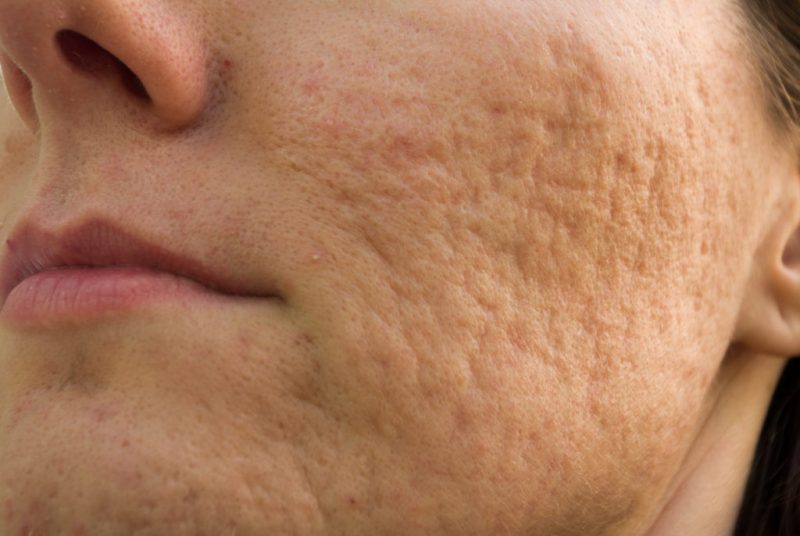
Treatment
Subscision – this is the best treatment for rolling scars. It is a simple surgery where a scalpel is used to cut out the fibrous base of the injury that holds the skin down from below. The process is done under anesthesia. Immediately the bands are cut, the skin relaxes and becomes smoother.
Micro-needling – this is treatment through the injection of fat and following it up with micro needling platelet-rich plasma. The purpose of micro needling is to create a small wound like pricks on the skin. It leads the body’s natural healing process to kick in which then boosts the production of collagen
Keloid and Hypertrophic Scars
Hypertrophic scars grow on top of the skin. They mostly affect men and are found on the torso. It is a common occurrence after experiencing a deep wound or trauma.
Keloids, on the other hand, are more severe. The only difference between them and Hypertrophic is that Keloids grows slightly more significant than the initial injury. Some people are more prone to contracting keloids. Unlike the ice pick and boxcar scars, the hypertrophic scar develops due to an overproduction of collagen. Keloids, on the other hand, continue developing collagen even after the skin has healed.
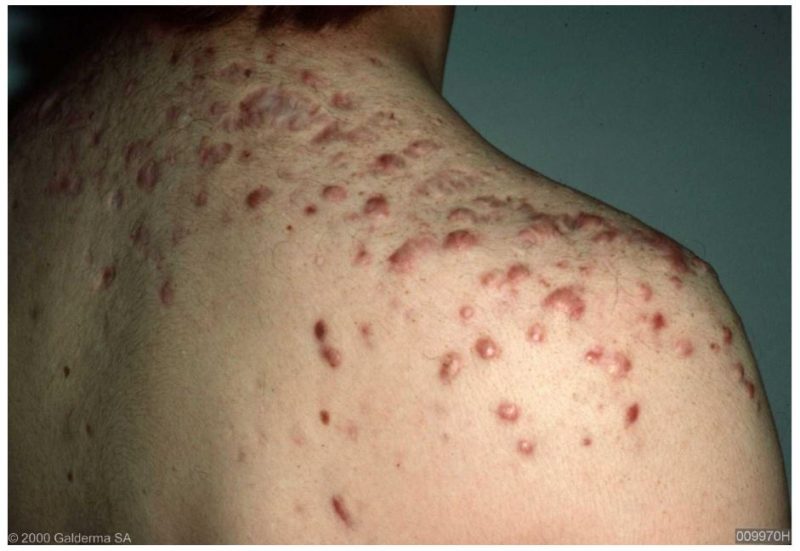
Treatment
There are several ways to treat hypertrophic and keloid scars. Depending on your preferences, you can choose to use steroid creams (cortisone), freeze the scar in fluid therapy (cryotherapy), use silicon gels, use tapes, take injections to shink and flatten the scar and use pulsed dye laser treatment.
It is essential to be careful whichever way you chose the treat your scars. You do not want to do it wrong and end up making things worse.
Post Inflammatory Hyperpigmentation
When a pimple heals and leaves a discoloration mark on your cheeks, it is not an acne scar. It is post-inflammatory hyperpigmentation. An area affected by post-inflammatory hyperpigmentation appears to have a color range of pink to red, purple, black or brown depending on your skin type.
It occurs when a wound or rash on the skin causes on inflammation. While the skin heals, a lot of melanin is produced thus darkening the area.
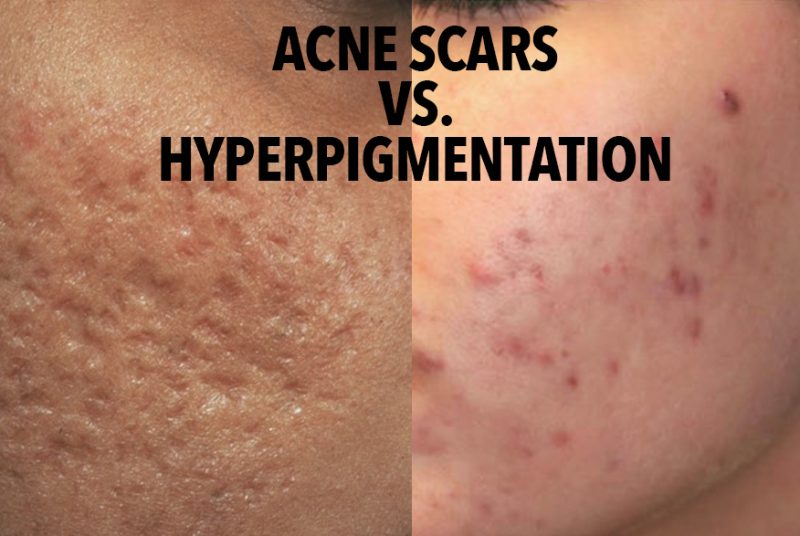
Treatment
Most of the time, the discoloration faded on its own. However, whenever it does not disappear, you can get some over the counter drugs to speed up the process. Get drugs containing alpha-hydroxyl acids, and you will be in a position to fade moderate discoloration. In case you have a severe case of post-inflammatory hyperpigmentation you can get a prescription of a topical retinoid or azelaic acid from your doctor. You can also use creams that contain hydroquinone.
Understanding the Treatment and Procedures
Before getting an acne scar you first start with acne. The difference is that acne can eventually disappear if treated appropriately. However, dealing with an acne scar is a different problem. Since acne scars come about with damaged tissue, if you have a pimple you should avoid picking them. It will lead to skin damage and late on scarring.
If you notice scaring on your skin, the first thing to do is get the acne problem under control. Visit a dermatologist and follow any given instructions. Do not bother with over the counter drugs. Get a prescription from an acne treatment professional.
Topical Retinoids
Used to deal with acne at the same time getting rid of dark marks and any acne blemish that is left. These dark sports are referred to as post-inflammatory hyperpigmentation. The post-inflammatory hyperpigmentation is not a scar. Given time, it may as well disappear on its own. The tropical retinoids help speed up the process and clear out even the toughest of marks.
The retinoids only deal with black marks on the skin. For pitted scars or depressed scars, you require more than just cream.
Laser Treatments
There are two types of laser treatments; ablative and non-ablative. Ablative removes the outer layer of the skin and resurfaces the skin. Non-ablative lasers perform subtle changes to the dermis without damaging the skin’s surface. Since the process is quick, they are referred to as lunchtime laser. Referencing to the one hour for lunch. Carbon dioxide and erbium-YAG lasers are the most preferred ablative lasers used to treat acne scars. It is mainly due to the ability of the lasers to burn skin tissue in a controlled manner and to a specific depth. The resulting skin is much smoother, with no noticeable atrophic. Also, the scarring is softened. Within two weeks the skin fully heals. Sometimes you may find that the red color does not dissipate for some time. Even so, that should not worry you. Within a few weeks or months, the redness will slowly fade. On the other hand, non-ablative lasers make the skin tight while stimulating new collagen formation. These lasers are most beneficial to people with mild acne scarring and pigmentation problems, instead of deep pitted scars.
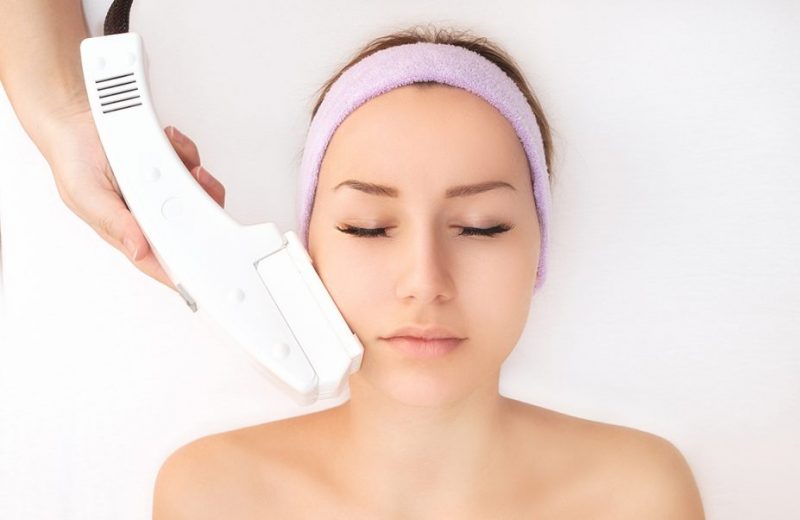
Just like everything else, some effects come with using laser treatments. Hypopigmentation, the loss of skin color, is one such side effect of laser treatment. This can be a big concern for most people with darker skin tones. Before using laser treatment, always consult a dermatologist and they will be in a position to advise you on whether you fit for the laser treatment.
Punch Excision, Punch Elevation and Punch Grafting
It is one best way to treat ice pick and other depressed scars. A small punch tool that looks like a cookie cutter is used to cut out the scar from the skin. After cutting out the scar, the surface is closed up. A small scar resulting from the treatment may be left, but it is generally less obvious than the original one. The new scar can slowly diminish with time. You can as well employ the use of resurfacing techniques such as microdermabrasion or laser treatment to fade it quickly.
After removing a scar, you can fill the void using a skin graft. The skin graft is mostly taken from the skin behind the ear. Also, punch grafts also have their scars. But they are less noticeable than pitted scars and can be resurfaced more easily.
Deep boxcar scars have bases that are comprised of normal-looking skin. You can use the punch elevation technique to get rid of the deep boxcar scars. During punch elevation, only the bottom part of the scar is cut out. The dermatologist then elevates the bottom to the skin’s surface, where it is attached with sutures or skin glue such as Dermabond. Unlike with skin grafting, the skin after punch elevation has the same tone and texture as the surrounding tissue.
Subcutaneous Incision
A subcutaneous incision is also known as subcision. It is used to treat rolling acne scars. It is as well helpful in some depressed acne scars. Subcision is a simple process that is performed under local anesthesia. A needle or small scalpel is used where it is inserted to run parallel to the skin’s surface. The practitioner cuts the bands of tissue that tether the skin to deeper structures. The skin loosens to these bands have been released, smoothing the skin surface’s appearance.
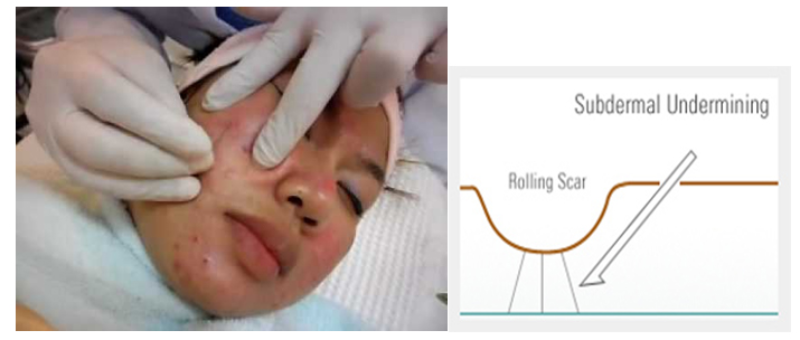
Read Next: Best Body Wash For Acne
Microdermabrasion
You should not confuse this with dermabrasion. Microdermabrasion is a skin care procedure performed by a dermatologist or even a professional spa attendant. During the process, a machine is used to discharge ultra-fine aluminum oxide crystals through a tube and onto the skin. The crystals are simultaneously vacuumed away. A patient using this treatment is required to get a series of treatments. Only the surface skin cells are removed. Microdermabrasion works best on hyperpigmentation. This treatment won’t work for pitted or depressed scarring.
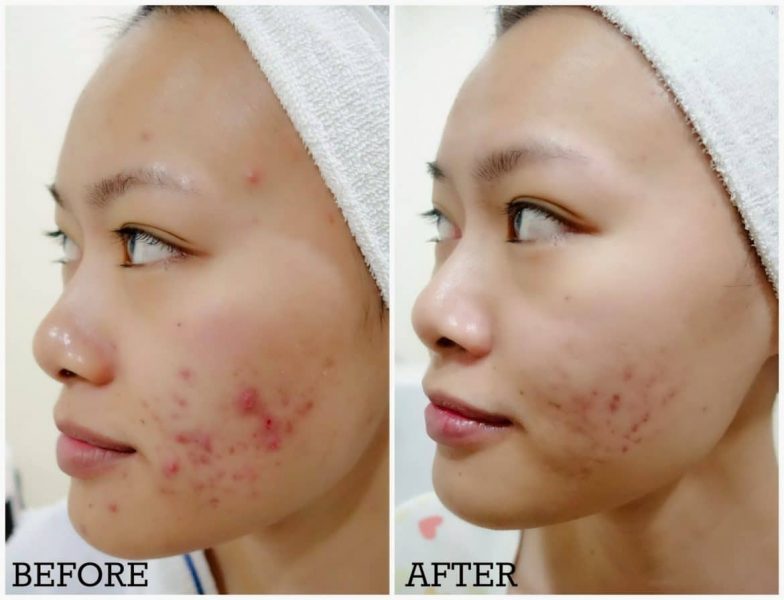
Dermabrasion
Dermabrasion is a procedure performed under local anesthesia by a dermatologist. A rapidly rotating wire brush scraps off the upper skin layers. After some time, the scars soften up, and the pitted scars are smaller in depth. Dermabrasion is used in the treatment of depressed boxcar scarring. You should not have the procedure if you have Ice pick scars. Mainly because, the process may make ice pick scars worse because while narrow at the skin’s surface, they often widen near the base.
It was once rated gold standard in acne scar treatment. However, dermabrasion is used less often. Many practitioners prefer the use of laser resurfacing techniques. Dermabrasion may cause skin color changes.
Using Dermal Fillers
Dermal fillers are used in the treatment of depressed acne scars.
Merely, the procedure starts by injecting a filler substance in the acne scar. This filler elevates the base of the scar, making it more even with the skin’s surface. However, you should note that the fillers do not offer a permanent solution.
It necessitates a continuous treatment one that requires the repetition of the process after several months. The substances used as dermal fillers include human and bovine collagen, fat transferred from the patient’s own body and hyaluronic acid. Contact your dermatologist to get more information on the different fillers and get to know which works for you.
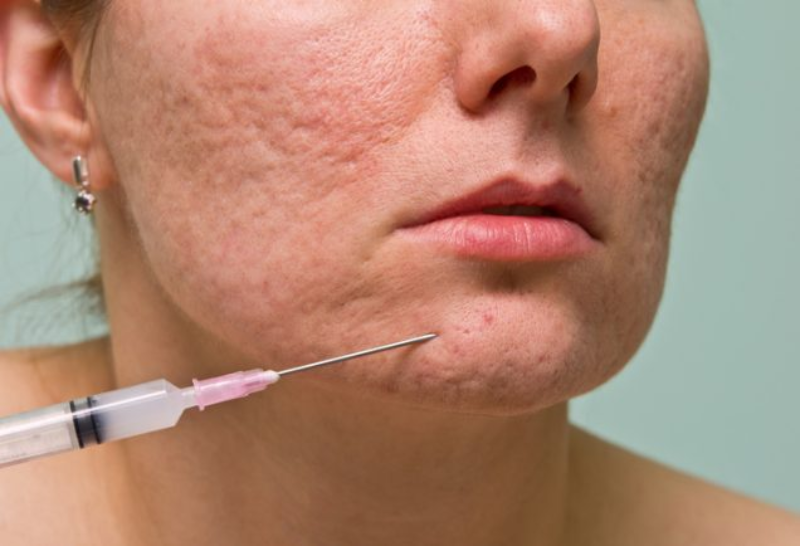
Taking Appropriate Steroid Treatments
If you have hypertrophic and keloid scars you may consider steroid treatments. The process of use is simple. One, you may inject the steroids directly into your scar tissue. It will lead to shrinking and flattening of the scar tissue. Once the scar tissue softens the overall appearance will be significantly improved You can then apply. Corticosteroid creams over the scar for several hours at a time. It may also be used to treat hypertrophic scars.
Micro-needling
It is a somewhat newer treatment where you use a needle to pierce on the surface of the scars. By puncturing the scar, the skin is stimulated to produce collagen and heals
Evidence suggests that micro needling can help reduce the depth of acne scars. However, this treatment can take up to 9 months to report any changes as indicated by the American Academy of Dermatology. Even so, the procedure is safe and can work for any skin tone.
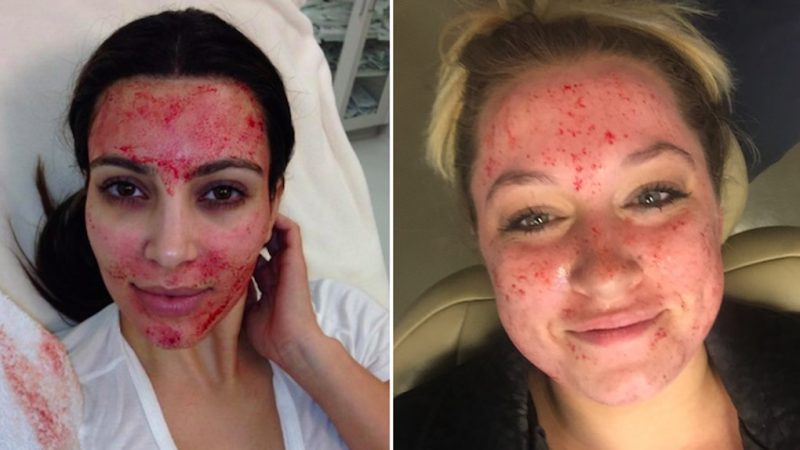
Chemical peels
If you are looking for a way to get rid of deep scars you should consider getting a chemical peel. A chemical peel is a strong acid that is used to aid in the shedding off of the top skin to catch some deeper scars. You can quickly get some of these chemical peels as they are mild enough to be used at home. The market is filled with many different types of chemical peels. You definitely cannot test them all. Choosing one may be confusing. Therefore, before using one, talk to your dermatologist and find the one best suited for your skin. It is best used for all kinds of acne scars. Even so, it is often used for deeper scars.
Using Salicylic acid in your Skincare
Salicylic acid is a compound found in a lot of beauty products. You may probably have used salicylic acid without knowledge of the benefits it has. You can use salicylic acid in the treatment of acne. Salicylic acid helps in clearing skin pores, reduces swelling and redness, and exfoliates the skin when applied on the surface of the skin. Getting products with salicylic acid into your skin care regimen will provide you with an added notch to fighting acne. The results may take weeks to show. However, it is worth the difference. Do not use it first without a talk with your dermatologist especially if you have sensitive skin.
Changing your Diet

Bad eating habits can lead to adverse skin reactions. The secret to fighting acne lies within what you know about your body and what foods it does or doesn’t react. Sticking to natural products is a good start, but again, not everyone is the same, and different people will respond to different things.
It brings us back to because your diet can play a role in you getting acne breakouts. Eating poor food with lots of fats and processed carbohydrates can lead to metabolic and hormonal changes that may trigger an increase in the oil glands which cause acne. Your diet may not necessarily be the cause of acne, but it can as well be the needed catalyst to stimulate the hormones that can cause acne.
Changing your diet will not eliminate acne. However, you gain the power hand in controlling the breakouts. With that, you can fight the acne better. Your skin is an organ. And just like any other organ in your body, you have to feed it correctly. If not it will start to show signs of breakdown.
Many people believe that the best way to fight acne is by using treatments applied directly to the skin. Changing your diet can help to fight acne at its source. To assist in the fight against acne, you need to choose foods that are wholesome and natural. Avoid processed foods entirely. They contain numerous chemical additives new to your body. It makes them very difficult to digest. Eating Fruits, vegetables and whole grains provide you with essential vitamins and fiber to help you digest your food properly. Foods rich in fiber are especially helpful since they help to filter the fat from the foods you eat. By consuming even fewer impurities, your skin has a better chance of being healthier and softer.
References:
Dermal fillers: https://www.asds.net/skin-experts/soft-tissue-fillers-for-scars, Seen 04/13/2019
Salicylic acid: https://www.livestrong.com/article/salicylic-acid-for-scar-removal/, Seen 04/13/2019

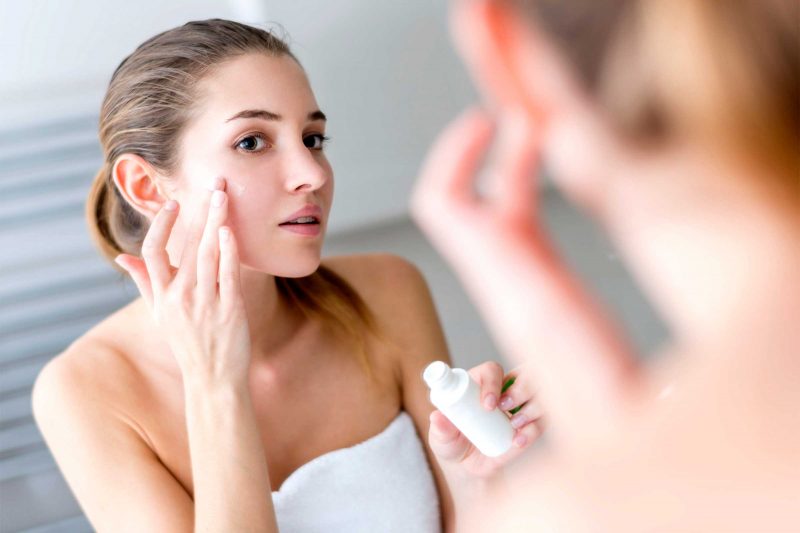
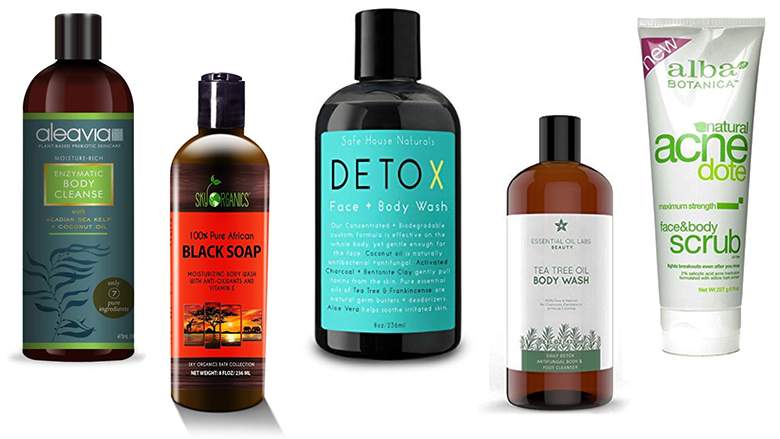
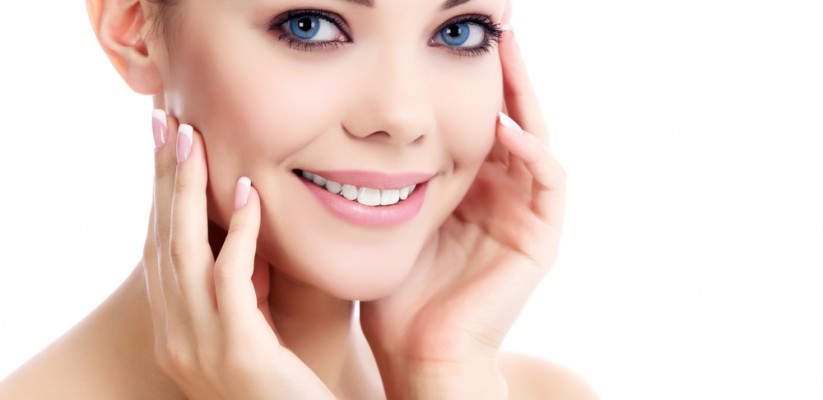
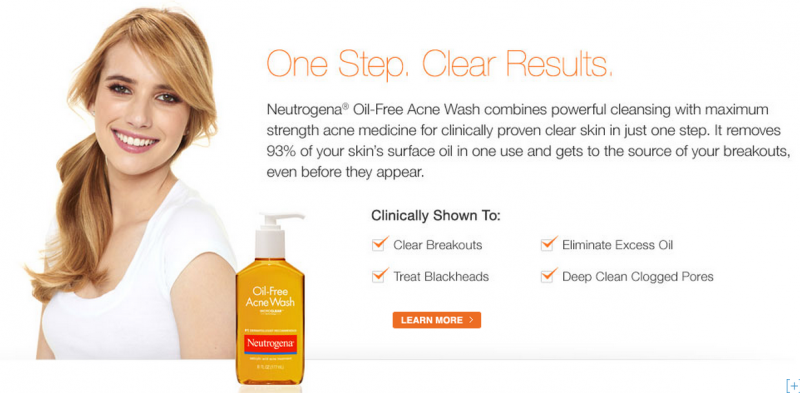
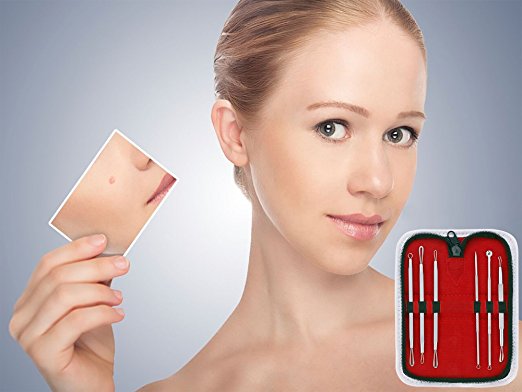
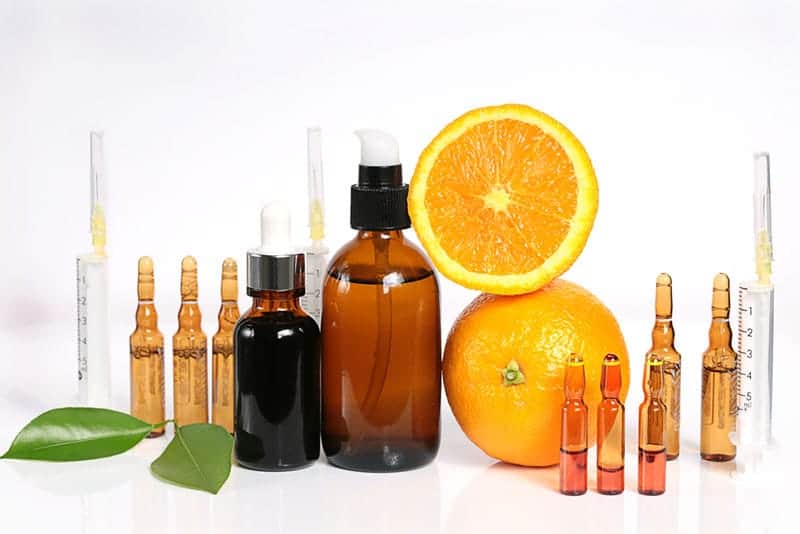
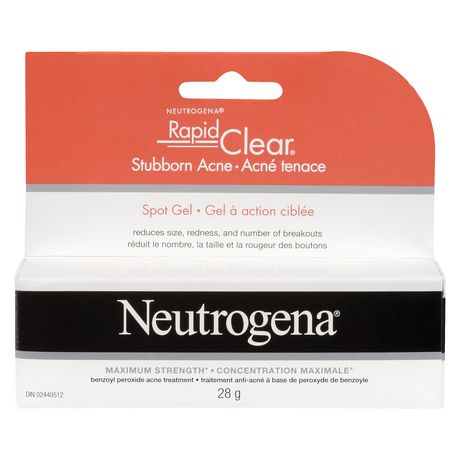
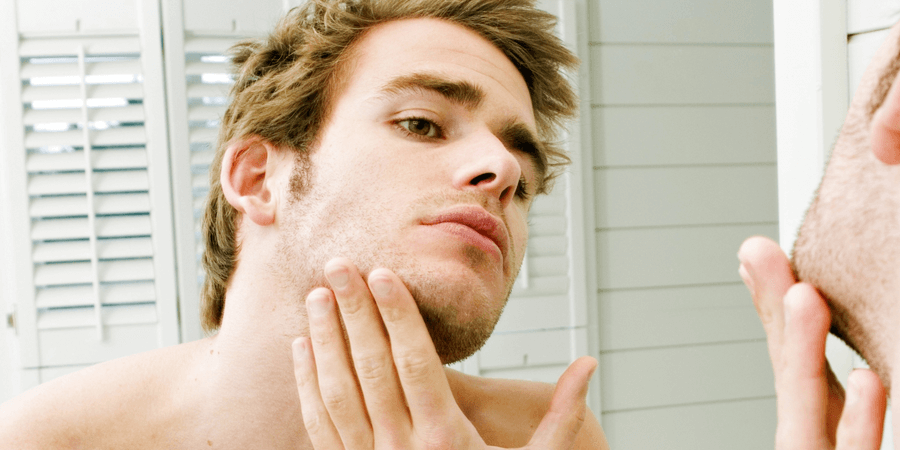
![11 Best Acne Treatment 2021 Reviews [According to Dermatologists]](https://cosmeticnews.com/wp-content/uploads/2019/01/Best-Acne-Treatment.jpg)